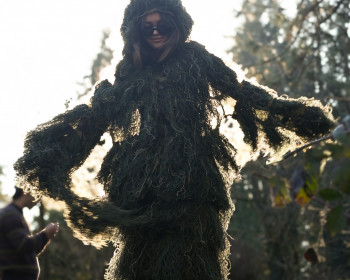Biology professor publishes friction research
Open gallery

Professor and Chair of Biology Kellar Autumn—a preeminent scholar in the field of gecko adhesion—has gained further distinction with a BBC News feature and the publication of a recent study.
Appearing in the prestigious Journal of the Royal Society, Autumn’s study “challenge[s] the conventional assumption that surface energy alone determines adhesion.”
“By using gecko foot hairs as a probe, we discovered something new about friction,” Autumn explained in a recent interview with the Portland City Science Club. “What lies below the surface can be as or even more important than the topmost layer of atoms.”
Along with colleagues in Germany, Autumn coauthored the study with Postdoctoral Research Associate Jonathan Puthoff and Research Technician Matt Wilkinson.
In a BBC News feature titled “The Real Spider-Man,” Autumn discusses the future of synthetic adhesives based on his research, which focuses on the mechanisms and evolution of animal locomotion and on developing biologically inspired materials and machines. His research has appeared in hundreds of newspapers, magazines, and programs worldwide, including NOVA on PBS.
The Gecko Lab website provides more detail about Autumn’s research and its applications in the design of climbing robots and novel adhesives.
Blue Lassiter ’15 contributed to this story.
More Newsroom Stories
Public Relations is located in McAfee on the Undergraduate Campus.
MSC: 19
email public@lclark.edu
voice 503-768-7970
Public Relations
Lewis & Clark
615 S. Palatine Hill Road MSC 19
Portland OR 97219

